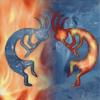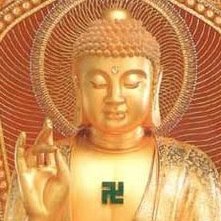Search the Community
Showing results for tags 'Teachers'.
Found 10 results
-
yes thats the reality gladly since we are on a roll . Lets welcome everybody not just dummies. Below is something to start us up
-
I came across this link I belive here in the bum's but I would like to hear your opinions on weather paying for it is worth it and is it authentic https://ancientmasters.org/
- 95 replies
-
- 1
-

-
- neigong
- cultivation
-
(and 3 more)
Tagged with:
-
Hi all, I am new here, and looking for recommendations for a teacher/school/lineage. I've been practicing healing tao for about 4 years now with a teacher who is very good at having us students experience certain techniques and embodiment of the practices, but not so good at structure and providing solid theory. I also get very lost in all the different types of qigong and taoism lineages and schools. Currently I am reading a book about the history of tao from Kristoffer Schipper, but for now it doesn't bring much clarity either So what I am looking for is more clarity about the different styles of qigong and tao lineages (maybe someone remembers a good post about this, or a book?) And I am looking for a new teacher Someone who is grounded and doesn't teach too extreme stuff, my aim is to feel better in my physical body, more vitality, groundedness and joy...but not necessarily to ascend to space and have crazy experiences haha maybe it will happen at some point, but it's not my goal. What I like about healing tao so far is the emotional balance it gives me through healing sounds, inner smile, heating the stove etc. I also really love bone marrow nei kung, and jade egg practices and breast massages. I don't do the advanced sexual practices of Mantak because I am very cautious I love dao yin, and for example I really love the qigong god's playing in the clouds, and also like kuan shi yin qi gong and crane bird qigong. A bit of a random selection of things I love, but maybe someone will read this and thinks, oh you should google this teacher! Many thanks!!
- 47 replies
-
- 2
-

-
- teachers
- healingtao
-
(and 1 more)
Tagged with:
-
I was introduced to qigong, like many of others, by mantak chia. but having studied some of his work i find it difficult to follow (and understand) and because there's so many methods out there i feel like there really should be someone much easier to learn from. who do you personally recommend that teaches in Book format or video - other than mantak chia or micheal winn? what im interested in (or at least would like a different approach to) - dan tien strengthening practices - universal orbit - sexual kungfu - inner smile - third eye - daily practical exercises i know youtube has plenty exercises but i dont like jumping from teacher to teacher to later find out im practicing incompatible or completely different methods that dont give any room to progress and learn deeper with. theres always a paywall somewhere, which i understand but, i want to double-down one just one instructor that has as much coverage on topics as mantak. i feel like mantak has so much popularity mainly because of the amount of content he has available. ive not come across any one else that comes even close to covering so many areas in qigong. for example - sexual kungfu and seminal retention. any suggestions? and yes ive tried google, mantak chia is the only one that comes up for SKF in detail. if not, i guess ill just stick with mantak. its not like the 'million dollar point' method is all that bad, right?... Right? Cheers
- 19 replies
-
- teachers
- personal experience
-
(and 1 more)
Tagged with:
-
Hello Doea any one know any systems or teacher in KL Malaysia. I have studied some neiging styles while in China and would like to maybe pick it up again. The styles that resonated with me the kost while practice were Bagua which i would regard as my main Nei gong, and taiji chen and wudang. Recently i have been spontaneously doing some xingyi round the apartment so maybe that is a sign. I have seen a few schools but i kbow from experience mot all teachers are equal and would like to know if anyone has recomendations Thank you in advance
-

Great Non-Self promoting Humble Teachers-any discipline: A Memorial
moment posted a topic in Systems and Teachers of
I had the privilege of meeting a great teacher in 1974 that was largely unknown. His name was Dave Harris out of Seattle, Washington. I was very young. Because of extensive boxing, wrestling, submission wrestling, Aikido, Karate (starting when I was 11 years old) I found many of the so called blackbelts in town to be mediocre. This made me a little full of myself. Then I met Dave Harris. His art was Tai Chi but, he liked to call it chop suey. My first sparring session at his home on 67th st. was a real eye opener as to what a true combat Tai Chi fighter at a very high level can do. I was totally helpless with this guy. Yet, he did it with amazing control, gentleness, kindness and openness. His wife, Gerry, came home during this and told us not to mess the place up. I told her not to worry, Dave had everything under control. He charged very little, he was more interested in your character and dedication. He did not self promote. He had studied under some of the great masters: Tchoung, Tohei, Raymond Chung, Pang, Woodcock, and Zhang Jie. Dave was very humble. All he wanted to do was teach anyone who was truly interested. (He also was a highly dedicated art teacher at North Seattle C.C.). Jesse Glover (of Bruce Lee fame) met Dave Harris when Jesse Glover was well known for his unique style of Sticking Hands. Afterwards, Jesse called Sifu Harris The Greatest Master no one has heard of. That is kind of the way Dave wanted it. The point I am getting to is: With all of these big name advertised masters all around, I would like to read about the tremendous teachers that have influenced your lives (in any discipline, martial or non-martial) and yet are largely unknown. A memorial of sorts. I am waxing nostalgic, please humor me:) -

Dr. Yang Yang - Evidence Based Taiji (EBT) and Qigong (EBQ)
9thousandthings posted a topic in Systems and Teachers of
Greetings, I was wondering if anyone had anything to share concerning Dr. Yang Yang and his "Evidence Based" systems. There is a local Taijiquan center (Maine Center for Taijiquan) where the lead instructor and others are certified in EBT/Q - and the beginners class is based on said curriculum. My previous taijiquan practice was cut short when the school shut the program down to concentrate on their more "external" programs. After napping for a spell I woke up this Spring ready to begin again ... and this center seems to hold potential. I like the feeling I get from the head instructor, and I like the feeling I get from the space. But thought I'd put a query out into the wind and see if anyone had anything to add about the system I might be getting myself into and what that may mean... thanks! -
I'm curious to hear about some people's understanding of progression in meditation. As an analogy, I'm an amateur computer programmer. I have spent a lot of time teaching myself from various sources. I also recently took a MOOC (massive open online course) in programming. The course was very well designed with a clear structure and progression from complete basics to more complex material. This was very useful for a couple of reasons. One is that in “submitting” to an externally imposed structure, I was encouraged to look at material that might either not have occurred to me to look at, or been too difficult or to easy. So an external structure can help to reduce the “Swiss cheese” phenomenon, which is a major pitfall in self-education. It also builds on basic skills with clear sense of direction and development. I have not come across many meditation teachers or traditions where this kind of clear progression is used or emphasised. It’s often been something of a “buffet” of various techniques which I can try and use as I see fit, with no clear signposts as to when and how to develop my practice. While I really value this kind of experimentation and empirical research, and believe that it is actually indispensable for empowerment and maturity as a practitioner, nonetheless I also believe that external structures for progression are extremely important. It would perhaps be foolish and conceited of me to imagine that I can educate myself in any subject better than teachers who have learned it thoroughly with the support of a tradition, and who have designed a curriculum based on years of experience of teaching and practicing. I’m also aware that practice often is circular, and so called “beginner’s” practices can also be used further down the road as “advanced” practices. I’ve been told d that a certain very simple Dzogchen practice is all that is needed for complete enlightenment, but that many people aren’t happy with simplicity, and so there are more complex practices to satisfy them. I feel that at my particular stage of my meditation journey, it would be good to undertake some kind of meditation equivalent of a MOOC with a really good “spiritual university,” to make sure my foundation is solid and help me on my way. I’d particularly like to hear any thoughts on this from a Theravada, Mahayana, Bon, Hindu or Taoist perspective.
- 8 replies
-
- 3
-

-
- Meditation
- Practice
-
(and 3 more)
Tagged with:
-
Some concerns and unanswered questions regarding learning Taoist Meditation with BK Frantzis The context of the following points is of my having practiced Taoist Meditation as taught by Bruce Frantzis for about fifteen years, with annual attendance at his meditation-related teachings and a practice schedule of one to two hours a day. Prior to that I had studied with senior EA instructors for nearly a decade, so I’m talking from a position of some experience, rather than hearsay or just having read some books. I have recently decided to take a break from the practices Bruce has taught me, and am re-evaluating my relationship to him as a teacher. Obviously I have got a lot from the practice of Taoist meditation or I wouldn’t have stuck with it for so long. However, the focus of this post is on the less positive aspects of my experience. · Bruce learned much of what he teaches studying one-on-one with his main Teacher Liu Hung Chieh for several hours a day over several years. He says in his books that personal feedback from a genuine master is essential for making progress and avoiding delusion. However, he doesn’t offer this kind of personal feedback. Instead, in my experience, he is not very approachable - in fact he can come across as very unfriendly. He will answer questions (in a manner that often comes across as reluctant and condescending), but in my experience he doesn’t always listen carefully or understand exactly what is being asked. The idea of having a relaxed, nuanced conversation with him about my practice seems impossible. This is in spite of the fact that in order to have the opportunity to talk to him I might have spent a lot of money and travelled a long way. · For some reason, there appears to be NO ONE else outside of China (excepting a few of his senior instructors) who teaches the method of Inner Dissolving from the tradition he claims to be part of. Perhaps when he started teaching, this was understandable what with the language barrier and general level of cultural exchange, but now, decades later, why are there no other representatives of the “Water Tradition” offering their teaching to westerners? · Whatever the reason for the last point, the situation is very unusual and prone to difficulties. After all, there is no realistic source of verification or alternative perspective or simply the opportunity to learn the same method from a teacher with a different personality. · Bruce is a student of Dzogchen master Wangdor Rimpoche, who has another student, Lama Lena, who offers much more support than Bruce. She told me that she only takes on as many students as she can maintain a personal connection with, and makes a point of always replying to emails written by students since she recognises how much effort and care has been put into writing them. Bruce has on a couple of occasions replied to messages from me on Facebook, for which I am grateful. However, one of these replies took over a year, and one message had no reply. · I understand that Bruce has many students and cannot be available to everyone. This seems fine for health practices, but when it comes to meditation, I find myself wondering if he is spreading himself too thin to make the path he teaches genuinely viable, in the absence of anyone else from his lineage available to offer guidance, feedback and support. · There sometimes seems to be a lack continuity or follow-up between mediation teachings. For example, one year in Oxford Bruce taught about how to dissolve the mind directly without going via the body, and another year he taught the use of sound to work with the first three energy bodies. Neither of these teaching had any follow-up as far as I know. There are also lots of audio and video resources available, which is great. However, without some guidance, it’s hard to know which of the many aspects and practices to work on at any given point. Bruce’s quote from Liu of “So, you’re a baby then, who needs to be told what to practice?” doesn’t quite sit right with me given the difference in learning contexts - ie intensive daily observation and input vs. annual workshops with many other students. · Maybe it’s a small deal, but why does Bruce feel the need to spend so much time talking about his achievements and just how amazing he is? For me it goes beyond instilling confidence in his credentials or the power of the practices and becomes somewhat grating. · The sense of always more - there is something about the way Bruce presents his teaching that I hear as implying that we as students are really complete beginners however long we might have been learning. Years ago a student of his who had left him said that it took meditation away from being a basic human activity everyone can do to something very elitist that you need special transmission in order to do properly. This a perspective shared by some Buddhist schools as well. It might well be the case, but there might also be an element of “the Emperor’s New Clothes” going on. It’s hard to say, and is a point of discernment. · Finally, in my recent research into alternative spiritual paths and teachers, I came across an article about Zen meditation in which the author wrote that to consider that someone is your teacher, you must see them in person a least once a year and they must KNOW YOUR NAME! Perhaps the crux of my whole experience here is that I predict a low probability that Bruce could remember my name unprompted, in spite of the time, effort and money I have put into learning from him. Of course one could argue that he has given me a great gift by sharing the teachings, and is in no way beholden to me, but regardless, there’s something about the totality as my experience which “doesn’t feel quite right.” The reason I’m going into so much detail and thinking and writing about all this is that it is actually a very big deal to move on from a mediation teacher and practice that has been a huge part of my life over such a long time. I think ideally I would not make this change, but with things as they are and not knowing how to address them, it feels more true to myself to cut myself adrift and see what else comes my way re spiritual guidance. It’s hard to measure the benefits I’ve received through my loyalty to this path, although I expect they are immense. I’d like to feel more at peace and have some resolution with Bruce around my experience, but maybe for now I need to allow myself to feel a bit angry and disillusioned in order to help me make the transition to the next stage of my journey. ***** I'm curious to read any constructive comments and/or feedback from what I've written. Has anyone here had similar experiences either with Bruce or any other teacher? I'm off to a weekend retreat on Mindfulness today. Should be interesting....
- 16 replies
-
- 8
-

-
- BK Frantzis
- Taoism
-
(and 2 more)
Tagged with:
-
Throughout the ages one common teaching can be seen to have been taught . The One God, the God that is All, that is the One totality of everything. Amilius- Edgar Cayce on Atlantis








